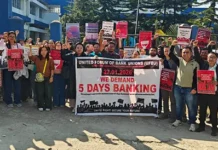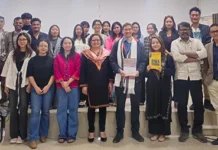[ Dr Pradeep Haldar & Dr D Padung ]
A topic that is seldom discussed has suddenly made its way into the news and gone viral. Are vaccines safe? Are they essential? Why does my child need vaccines? These are some of the questions being posed.
The government-run immunization campaign, the measles-rubella (MR) drive, aims to eliminate measles and control rubella/congenital rubella syndrome (CRS) by 2020. This largest ever vaccination campaign worldwide aims to cover approximately 41 crore children in the age group of 9 months to below 15 years.
Now, with reports of a resurgence of measles in Europe and in the United States, we all need to take stock of the reasons for these concerns. We also need to be afraid of what would happen if we didn’t immunize.
A few decades ago, diseases such as polio, smallpox, and neonatal tetanus caused widespread disability and death among children worldwide. Clean water, sanitation, and access to healthcare facilities alone could not have contained these deaths, so medical science came to the rescue.
India is free of these diseases because safe, effective vaccines were developed.
India’s MR vaccination drive is aimed at preventing debilitating diseases. A country where many people do not have access to safe and clean drinking water, proper sanitation and adequate health care needs a robust vaccination programme to protect the health of the children.
In a country of 1.2 billion people – with varying social and economic realities – prevention is always better than waiting for treatment. Vaccine-preventable diseases, such as pneumonia, diarrhoea and measles are significant contributors to child morbidity and mortality in our country. The risk is not only child death but also that children who do survive these disease are at risk of long-term effects such as suffering deafness, seizures, motor impairment, cognitive impacts and stunting.
Today’s vaccines are safer and more effective than ever before. They are tested through rigorous and continuous scientific study – years and years of data collected from tens of thousands of children – before they are licensed for use. Before a vaccine makes its way into the Universal Immunization Programme (UIP), the health ministry and other competent technical expert bodies analyze, discuss and deliberate on the vaccine’s safety and efficacy, among other key considerations. The economic and social dividends awarded to the community are substantial, particularly when one considers that vaccines are able to reach the poorest and most vulnerable, who are disproportionately impacted by the tragic consequences of a severe disease.
Every year, 2.6 crore children are born in our country and immunizing the population has far-reaching effects that influence parents’ confidence in the health system. If we are to reap the benefits of reduced child mortality and avoid inheriting a population stricken with diseases, we have to ensure their good health and wellbeing.
Vaccines are technological advancements that will enable India to look forward to a healthier future and help secure India’s position among other strong and economically contributing nations.
When children are not vaccinated fully and on time, the entire community’s health is at risk. This has to be a group effort, involving national and state officials, doctors, parents, families, children, hospitals, healthcare workers, citizens, and those who can raise awareness around it.
Parents must ensure that their children are vaccinated to protect not only their children but other Arunachalee children, as well. Arunachal Pradesh has never needed science more than it does today. With population growth, climate change, new infectious diseases, antibiotic resistance and several new threats emerging each day, the need for new vaccines is urgent. Now is the time for all to work together to safeguard the health of our children, our future, Arunachal Pradesh, and our India. [Dr Haldar is Deputy Commissioner, Immunization Division, Ministry of Health & Family Welfare, Government of India, and Dr Padung is State Immunization Officer, Arunachal Pradesh]





